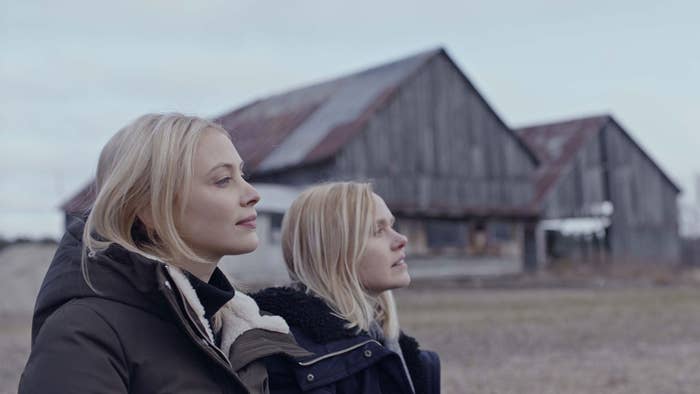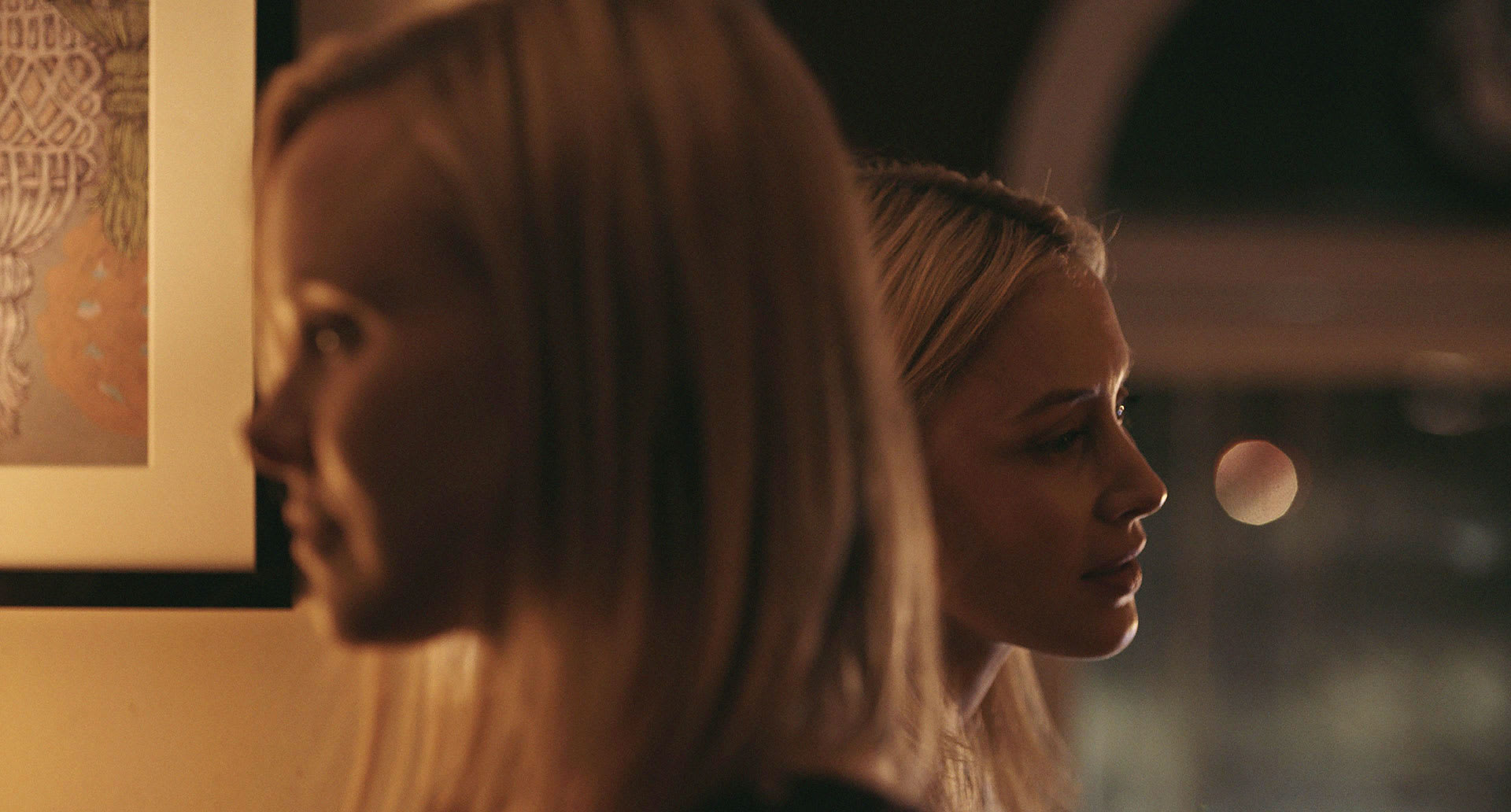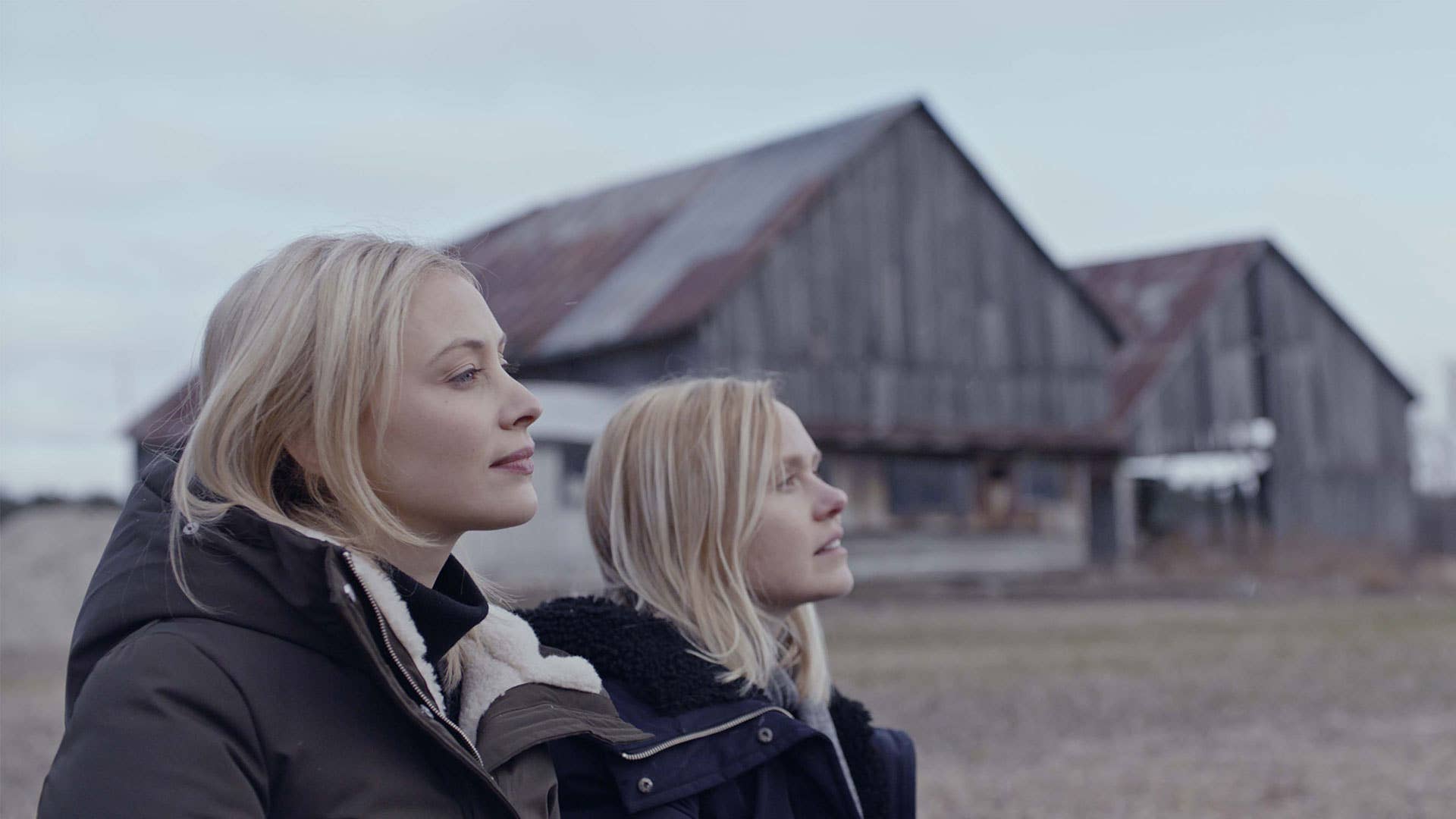
All My Puny Sorrows is a heart-wrenching drama that premiered at TIFF last year and is finally releasing in theatres this Friday. The film is written, produced, and directed by Michael McGowan, serving as an adaptation of the 2014 novel of the same name by Miriam Toews. Toronto actresses Alison Pill and Sarah Gadon star as two Mennonite sisters who left the community after their father unexpectedly killed himself.
Yoli (Pill) is going through a tough divorce while her sister Elf (Gadon) is a well-known concert pianist whose bouts with depression threaten to consume her. The film takes a look at how Yoli and Elf, confront—and fail to confront—tragedy and trauma in a battle to survive.
We spoke to Pill and Gadon about working on this sensitive subject matter, filming during the pandemic, and how they bring out the best in each other, having known one another since they were young.
I loved how the family in this film deals with grief though humour. Could you relate to the way these characters went through this process?
Alison Pill: Yeah, I mean, one of my primary defenses is humor. It’s how I roll. It’s how we avoid uncomfortable topics, and it is very useful. So I can definitely relate to it. Also, I think finding the funny in everyday existence and finding not only the funny, but the silliness or the absurdity of life with people is really essential to survival. And I think that it this film and the novel make the case for that quickly.
Sarah Gadon: I think that’s what’s so brilliant about Miriam’s writing and in all of her novels is the moments of humour that she finds her stuff is just so funny. I think it’s a testament to Mike in the adaptation to kind of hang on to that humour. And it’s one of the things that I love so much when I watch the film, and what I love about Allison’s performance in it in the way that Elf and Yoli interact, and it’s something that I definitely can relate to, in my own family, for sure.
To put such emotional weight in a film like this, I was wondering about the conversations you had about the subject and material. What did the two of you discuss about the themes and sisterhood to effectively capture that on screen?
Pill: Well, first, I think a lot of our shared childhood and youthful experiences definitely already lent us a kind of historical safety. Like, I know this person, I already trust this person. And I know this person’s work and we haven’t seen each other for a while, but there is a sort of safety in broaching these topics and then very quickly finding our way into those discussions through the work. Also, the fact that we were sort of isolated from the world and in North Bay in you know, Fall/Winter 2020 and human contact was really exceptional at that point. We were able to get deep very quickly and I think it’s unavoidable in these things… opening up about stuff in my own family that reflects some themes in the novel and the movie and trusting ourselves with the material and with each other’s hearts through the whole process was essential to the whole thing working.
Gadon: I think there was something to shooting the film in November, December of 2020. Allison and I have kind of woven in and out of each other’s lives a lot from the time that we were kids, but then to kind of meet up inside of this time that’s a pandemic, and in November of 2020 there was so much uncertainty about what was going to be happening in the next couple of years. For me, 2020 was just such a weird year and like everybody else I experienced so much loss. So when we kind of met up it was so nice to actually have a project to process emotion through because I was walking around in 2020 having not worked, just kind of like, I can’t seem to process what’s happening because I can’t work, and so much of processing my environment and my experiences is through my work. So finally it felt like we got have the privilege of actually being able to work that year. We could just meet each other in this place of like, “Oh, OK, now, you know, we can dig in.” It’s so great to meet each other in this time, because it was like catching up on each other’s lives and finding each other at this bizarre place, and then tucking into something that is so dense and rich, and being able to kind of work through so much with that material was really special.
“Of course we’re angry. It’s really hard to be a human. [Laughs.]” – Alison Pill
Sarah, is that why you said that your personal process when it came to this film was more intellectual than emotional?
Gadon: I think that my process always begins intellectually. I need to like interrogate something before I can trust something to drop into it emotionally. That’s just kind of how I tick, like I can’t put myself into an emotional place until I get on some rational level and I can understand it from the character’s perspective. And Alison, she’s so thorough, and also so researched, and so involved in the rehearsal process that it was so great to be able to work together in a similar way, and spend a lot of time just working through the material together.
What did you learn about each other as actors that you weren’t perhaps aware of before this film?
Alison: Sarah brought such clarity to my own process and work ethic that I don’t think I’d had previously. I have been working towards it over the last few years of going like, ‘This works. This doesn’t this feel bad.’ And I think Sarah is wonderfully unapologetic about both her process and her questions and just her powerful intellect, just her powerhouse nature generally. I had been seeking away through this kind of like Canadian female apologetic [attitude]. And now, especially in the last few years, and then becoming a mom and starting to realize like, ‘No, you know what, I do have good ideas’ and through different collaborators sort of starting to get to that point. But I think it really crystallized in my relationship with Sarah and in our process together on this film of having this person as an inspiration to be like, ‘Why the fuck should I be sorry? I have a good idea. No, listen to me.’ And it was deeply empowering. It was such a special time to have that crystallized because so much was sort of upset in this global pandemic, like the systems we started to question and are continuing to question and all of these things kind of adding up to like, ‘OK, we get to question things.’ Like, we can question everything, everything is questionable in the best way.
Gadon: I’ve always known what an incredible actor and performer Alison is. I’ve seen so much of her work, and she’s so talented. And I think that so many people maybe don’t know how fucking funny she is. She’s such a strong comedic performer. She has so much physical humor in her performance as Yoli and that was something that I was always surprised and delighted to see in every interaction that I had with her and so much of, I feel, my performances as Elf is in appreciation of who she is as an actor.

I do want to follow up with you Alison on what you said about Canadian women and being unapologetic because I love that garage scene where Yoli just shows her rage, and female rage often makes people so uncomfortable. Can you talk about that?
Pill: It’s really very interesting because I read that scene and it was one of the things that I was most excited about because of that. The scene in the novel made me laugh out loud, and there’s this follow up elevator scene in the novel, where she has to ride with the baby and the wife. But it was one of the few scenes that we didn’t rehearse because it’s mostly just me talking. So when we got to set that day, I did the first take and it was just the way I’d read the scene, she’s losing it and she’s really angry at the world and whatever conception of God remains in her life—like everything, at her sister, at the hospital at the institutions. [Laughs.] Mike and the entire crew were really taken aback and scared. And I think that does speak to what you were saying, because I was like, ‘Oh, no, that lives inside me all of the time. That’s like, underneath it all, always.’ So the fact that that’s a surprise… I think we need to get better at recognizing rageful impulses; they’re not always constructive. It’s not something you should indulge in frequently. Rage is scary, it’s not great but it happens, it exists. And I think seeing it is really important, because it shouldn’t be that shocking. Of course we’re angry. It’s really hard to be a human. [Laughs.]
“The truth is that depression can look like so many different things and that’s often what’s tricky about it and has confused our understanding of it. So that was one of the things that I felt was really important that we showed in the film, was that she can be depressed, and then she can also laugh.” – Sarah Gadon
Mental health has been an important conversation in the last two years, especially with the pandemic. So when you have spent time immersing yourself in the themes of the film, do you emerge from this project in a different outlook or about the bigger picture, especially considering the pandemic, which has forced us to evaluate and reevaluate so many things?
Gadon: Yeah, I mean, absolutely. I think that one of the things that really stuck out for me when I was talking with Miriam about her sister was, she talked about how smart and funny and passionate and how she was more than just this… I think we have this idea of someone who’s depressed as like, someone with a rain cloud over their head who can’t get out of bed. The truth is that depression can look like so many different things and that’s often what’s tricky about it and has confused our understanding of it. So that was one of the things that I felt was really important that we showed in the film, was that she can be depressed, and then she can also laugh. She can also see the irony of her situation and make a joke about herself. She can also love deeply and passionately her sister and the other people in her life. There are just so many tropes about depression that we’ve seen over and over again, and one of the things that I feel like Miriam’s novel really breaks open is that trope of the depressed woman. So I wanted to make sure that in playing this character, I did service to that.
I think that the thing about mental health, and I think that there’s just so much that we don’t understand and don’t know in our country. I think this movie can be polarizing in the sense that it talks so candidly about suicide and it brings up themes of assisted suicide, and it shows an impassioned view to assisted suicide. What I like as my role as an artist is that we get to continue to question things, kind of like what Alison was saying; that I don’t think I went into this with any really like definitive concrete ideas about mental health. I didn’t come out of it with any definitive concrete ideas of mental health. I think the whole point of it was the exploration.
Once you’ve gone to these dark places in your mind with these characters, how do you shake it off at the end of the day once filming was done? What is your break for your mental health? What did you have to do?
Pill: Sarah was staying in a cabin in the woods. So I’m driving out to her cabin in the woods to like rehearse or run lines. I brought my kiddo to go canoeing one day and like, hot chocolate times. So there was a lot of finding community in isolation, and finding joy in all of it. For me, my kid was there for most of the shoot. So when I get home, and it’s bath time and storytime. I don’t think I realized in my youth what a luxury it would be to sort of be so self-obsessed that you’re like, ‘I’m gonna stay in this forever, and I’m gonna really lurk in the depths, and just whatever.’ It’s not a choice for me anymore, which is great because I find fulfillment outside of work as well as within it. My life is far more balanced than it was. There were a lot of snowsuit fights because it was North Bay in the winter, and my kid has not had to grapple with the whole snowsuit situation. So the biggest drama, honestly, was like trying to convince somebody to wear frickin mittens together.
And lastly, Complex always loves to know about what are some of your favorite places in Toronto that you love to unwind at? You know, especially to take a break from everything.
Gadon: Recently, I’ve been going to this studio Jaybird, which is an infrared yoga and pilates studio. I felt like that got me through the end of the wintertime, just being able to go and sweat it out after such a freezing cold winter. And being here all winter, that really helped me decompress, and then I just moved near High Park. And so I love going to High Park and just walking around listening to a book or a podcast and just unwinding. I like being in nature. So that’s the closest we’re gonna get in the city.
Pill: I love Fresh. I love that restaurant. Any location, anytime. I will get like three entrees. Like I was there for TIFF and went to Fresh. I was there for 48 hours and went there twice. I really love it there.


